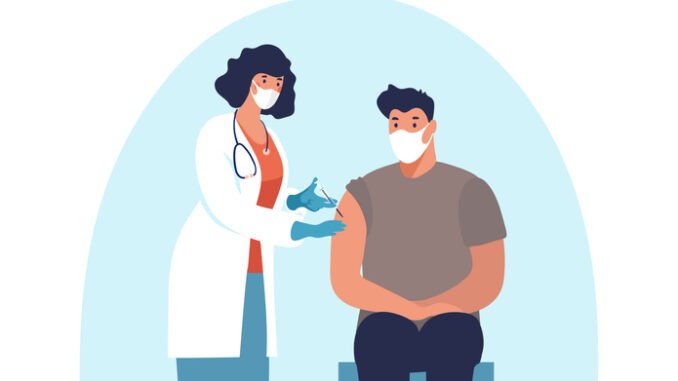
With uptake of the MMR vaccine falling in the UK, Emma Wilkinson examines whether anti-vaccination sentiment around COVID-19 has played a part
CREDIT: This is an edited version of an article that originally appeared on The BMJ
Despite being in a fairly deprived and diverse area of Sheffield, the Wincobank Medical Centre has always achieved good uptake of childhood immunisations; this year, however, the centre will be penalised financially because of declining immunisation rates and new payment structures.
Anne Noble, a GP partner, recently wrote reminders to any parents whose child had missed an immunisation and, while doing, so she noticed that the practice nurses had already had detailed conversations with all of them. “This is anecdotal, but we’re finding quite a lot of parents saying they have researched the vaccine and are refusing it,” Dr Noble told The BMJ. “COVID vaccine hesitancy seems to have impacted on it, unfortunately. There seems to be a loss of trust, which is both sad and worrying.”
Falling coverage
On 1 February the UK Health Security Agency warned that coverage of the measles, mumps, and rubella (MMR) vaccine’s first dose had dropped below 90% in two-year-olds and, by age five, uptake of two doses had dropped to 85.5%—well below the World Health Organization’s 95% target needed for elimination of measles. The latest quarterly vaccination figures show very small drops in uptake in England from July to September 2020, and uptake continued to decline over the next year.
And it’s not just MMR; small decreases have been seen in coverage of other childhood vaccines including the combined diphtheria, hepatitis B, Hib, polio, tetanus and whooping cough vaccine, as well as those for rotavirus and meningitis B. MMR is the one that public health officials worry about most because of historically lower uptake and the risk of outbreaks.
Impact in deprived areas
Anthony Gore, a GP and clinical director for young people and maternity commissioning at NHS Sheffield Clinical Commissioning Group, said that MMR rates seemed to have fallen further in the more deprived areas. In Sheffield this disparity is particularly stark because there’s a clear divide between the two halves of the city, but it will be repeated around the country, he added.
It’s not clear exactly how much the anti-vaccine sentiment around COVID jabs is feeding into routine childhood immunisations, as these deprived areas have always struggled to get good uptake – COVID included. “They are also the areas where, if MMR uptake falls, you can guarantee you will get a measles outbreak – and, if you get a measles outbreak, a child will die,” said Dr Gore.
One recent international study found that trust in government was linked to COVID vaccine uptake. Fluctuations in childhood vaccinations may be due to complex reasons, partly related to accessing healthcare during the pandemic, as separate research in 2020 found some confusion among parents over whether services were still open. Yet GPs in deprived areas now face being penalised financially at a time when they may need extra resources to improve uptake; this is because some immunisations, including MMR, have been added to the Quality and Outcomes Framework (QOF), where GPs have to hit 95% uptake to achieve the full payment.
Dr Gore said that this change to the QOF now seemed like a very bad idea, as the practices which have to work the hardest would have fewer resources. He added that they wouldn’t be able to do it alone, and called for concerted national and local campaigns to improve uptake. “Childhood immunisation rates look like they’re being affected by general chitchat on social media and anti-vaccine messages that were specific to COVID,” he said. “We need to start the pushback against that idea.”
A lack of awareness
Awareness may be part of the problem. Research commissioned by the Department of Health and Social Care showed that almost half of parents were not aware of the serious complications of measles, and only four–in-10 knew that measles could be fatal.
Farzana Hussain, a GP in Newham, east London, began carrying out drive-through vaccinations at the start of the pandemic when she realised that uptake was falling. The practice is still having to work incredibly hard to hit QOF targets, and uptake is currently in the low 90s. “We have an admin person who spends an hour a week calling parents; without this I think we’d be at 50%,” Dr Hussain told The BMJ. “Most say ‘Yes, they will come in’ – and then never turn up.
“We really need to know what their concerns are; is it trust about vaccination, or is it that they are very busy and not coping? It can take a lot for someone to tell you, and everyone probably has their own unique reason.”
Lessons from COVID
Provisional data in England and Wales show almost 700 measles cases in 2020. In 2018, outbreaks led to 2,557 cases and two child deaths; this is not a disease of the past, but it could be.
Greg Fell, Sheffield’s director of public health, says that lessons could be learnt from the COVID vaccination campaign. “For some people these are difficult-to-access services, so we probably ought to try a bit harder,” he said, “not just to run a vaccination clinic in a surgery a mile away, but bring it to the community centre, bring it to the mosque, and work with those community leaders. That’s being organised now.”
While work during the pandemic has successfully overcome some hesitancy about COVID vaccines, Dr Fell says that real anti-vaccination messages had not been properly tackled. “Historically, we’ve been reluctant to publicly take on those messages because it creates a lot of noise and people get more confused in the crossfire. We’re all going to have to reflect on how well we’ve done at this, locally and nationally.”
Helen Bedford, professor of child health at UCL Great Ormond Street Institute of Child Health, highlights that vaccine uptake guidance from the National Institute for Health and Care Excellence was due later this year but that the underlying reasons for declining vaccinations would be complex. “It is quite difficult at the moment as we don’t have any solid data; we have the uptake figures, but we don’t have the attitudinal stuff,” she said, and identified the massive shortage of health visitors, many of whom were redeployed in the pandemic, as a factor. It’s also worth noting that vaccine uptake increased in Scotland, she adds.
“With health visitors, it’s young families missing out on those early contacts—where you talk about vaccination, encourage parents to take it up, and remind them about it,” she says. “That’s one issue that I think is really important.”


Be the first to comment